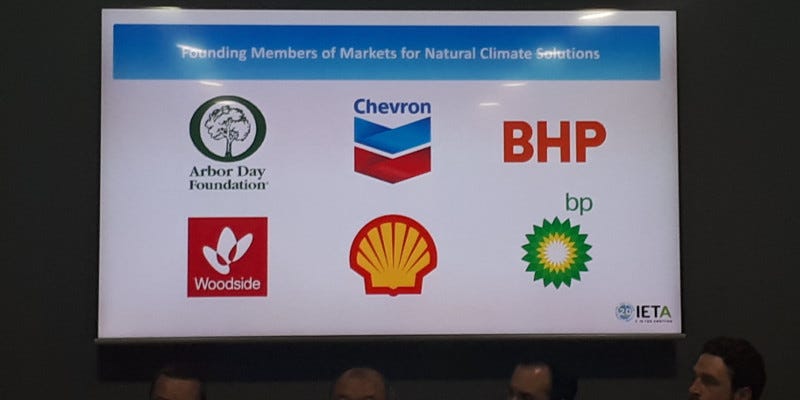Launched at COP25, IETA’s Markets for Natural Climate Solutions is greenwash for the oil industry
On 5 December 2019, at COP25 in Madrid, the International Emissions Trading Association held a side event to launch its Markets for Natural Climate Solutions initiative. The aim is to help create “Global markets for carbon credits generated from Natural Climate Solutions which enables private sector investment at scale.”
If there was any doubt that the idea of Natural Climate Solutions was going to be co-opted by the oil industry as a distraction from the urgent need to leave fossil fuels in the ground, that doubt has now vanished without trace.
The founding members are four oil and gas companies (Shell, Chevron, BP, and Woodside Energy); a mining company (BHP); and a US-based tree planting organisation, the Arbor Day Foundation:
This marriage made in hell was launched by a panel moderated by Dirk Forrister, CEO of IETA. Before the event, IETA advertised five speakers:
Simon Henry, Director, Carbon Market Development, IETA
Kelley Kizzier, Associate Vice President for International Climate, Environmental Defense Fund
Duncan van Bergen, Vice President Nature Based Solutions, Shell
Enric Arderiu, Originator, Global Environmental Products, BP
Jeremy Manion, Lead of Forestry Carbon Markets and Natural Climate Solutions, Arbour Day Foundation
Kizzier wasn’t on the panel leaving an all male panel.
When Shell’s Duncan van Bergen spoke, dozens of activists stood up, put their hands over their ears and walked out of the room.
“Quite divorced from reality”
In the questions following the presentations, Simon Lewis, Professor of Global Change Science at University College London, said, “This is quite divorced from reality, what you are all discussing.”
In These Times reports that Lewis explained that even if every possible natural climate solution were used worldwide, it could only offset about 20% of global greenhouse gas emissions. Emissions cuts have to come through reductions in fossil fuel use.
But the problem with natural climate solutions is not just that they cannot generate enough carbon offsets. Carbon markets and offsets simply do not work.
Earlier in the week, Friends of the Earth International and other NGOs released a petition signed by more than 160 environmental and indigenous rights groups opposing carbon markets in the Paris Agreement. The petition states that,
Carbon markets do not work. Cap and trade schemes have failed to reduce emissions or deliver real climate action. Under carbon market schemes, global emissions have continued to rise. Intrinsic flaws and loopholes render them unworkable.
Greenwashing the oil industry
While Friends of the Earth International and many others are working to keep polluters and offsets out of the UN climate negotiations, US-based BINGOs are working with the oil industry to allow them to continue polluting by greenwashing their operations with offsets.
In April 2019, Shell announced that it was planning to spend US$300 million on “natural ecosystems as part of its strategy to act on global climate change”.
The Nature Conservancy has been working with Shell since 2009, and is actively involved in Shell’s work on natural climate solutions. Shell’s press release about natural climate solutions includes a quotation from then-CEO of TNC, Mark Tercek, welcoming Shell’s greenwash.
Conservation International has been working with BHP since 2011. Conservation International was one of the organisations behind the International Finance Corporation’s five-year “Forests Bond” that bailed out the Kasigau Corridor REDD project in Kenya, and helped greenwash BHP – the company responsible for Brazil’s worst environmental disaster.
In Guyana, Conservation International accepted US$10 million from ExxonMobil, after the oil giant discovered US$200 billion offshore oil reserves.
IETA’s Advisory Panel for its Markets for Natural Climate Solutions consists of the following:
Maggie Comstock, Climate Consultant, Conservation International;
Suzi Kerr, Chief Economist, Environmental Defense Fund;
Kelley Kizzier, Associate Vice President for International Climate, Environmental Defense Fund;
Dan Nepstad, Executive Director, Senior Scientist, Earth Innovation Institute;
Agustin Silvani, Head of Conservation Finance Division (CFD): Conservation International;
Chandler Van Voorhis, Managing Partner, Green Trees;
Chris Webb, Director, Climate Markets, The Nature Conservancy.
This Advisory Panel amounts to a collection of sell-out NGOs who blindly ignore the contradiction between working with multi-national oil corporations and trying to prevent the climate crisis.
The oil industry has spent millions funding climate denial. It has spent further millions on lobbying to block climate legislation. In March 2019, a study by InfluenceMap showed that since the Paris Agreement, Exxon Mobil, Shell, BP, Total, and Chevron have spent a total of more than US$1 billion on delaying, controlling, and lobbying against climate legislation.
The oil industry has always been keen on carbon trading – for the obvious reason that it allows them to continue profiting from pollution. BP poured US$5 million into the World Bank’s Carbon Fund, part of its REDD carbon trading scheme, the Forest Carbon Partnership Facility.
Paying so-called environmental organisations to do their greenwashing for them is just one more example of the oil industry’s climate denialism.






